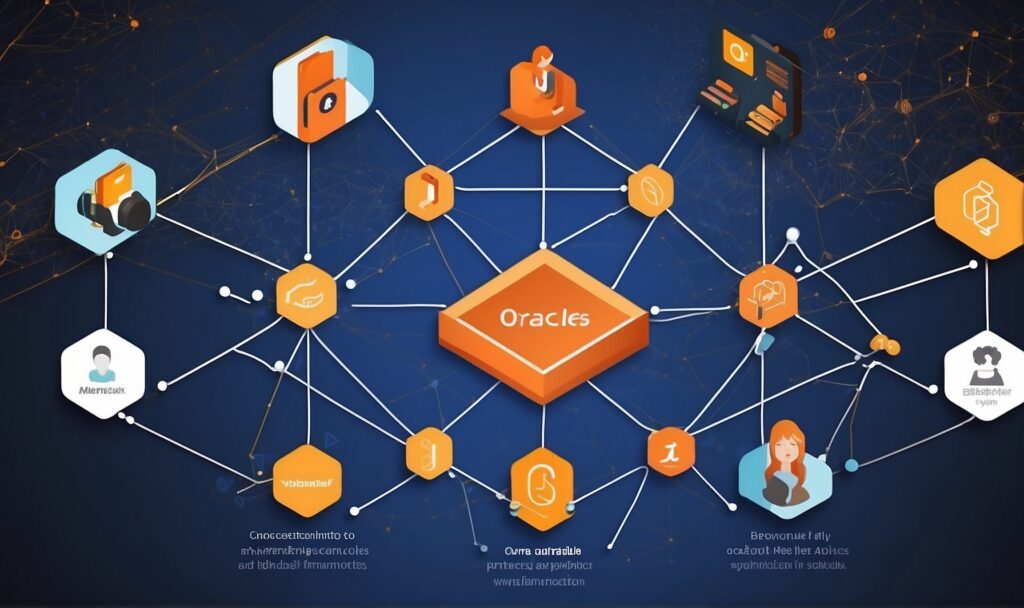Introduction
Blockchain technology has revolutionized various industries by introducing decentralized, secure, and transparent systems. However, despite its transformative potential, blockchain faces limitations when it comes to interacting with real-world data. This is where oracles play a crucial role. In this blog post, we will delve into the significance of oracles in blockchain applications, exploring their functionalities, challenges, and the impact they have on the broader blockchain ecosystem.
1. Defining Oracles in Blockchain
To understand the role of oracles, it’s essential to define what they are in the context of blockchain. Oracles act as bridges between smart contracts on the blockchain and real-world data. Unlike traditional smart contracts that operate solely within the blockchain environment, oracles enable these contracts to interact with external data sources, APIs, and events. Essentially, oracles bring external information onto the blockchain, expanding its capabilities beyond the data contained within the network.
2. Functions of Oracles in Blockchain Applications
2.1 Data Feeding: The primary function of oracles is to provide blockchain-based smart contracts with real-world data. This can include anything from stock prices and weather conditions to sports scores and currency exchange rates. By incorporating external data, smart contracts can execute predefined actions based on the information received, enabling a broader range of use cases.
2.2 Triggering Events: Oracles play a pivotal role in triggering events on the blockchain based on external occurrences. For example, a smart contract governing an insurance policy could be programmed to automatically execute a payout if a predefined event, validated by an oracle, takes place in the real world. This functionality enhances the automation and efficiency of blockchain-based processes.
2.3 Decentralized Decision-Making: Oracles contribute to decentralized decision-making by providing the necessary external information for consensus mechanisms. This is particularly important in decentralized finance (DeFi) applications, where accurate and timely data is crucial for executing financial transactions such as lending and borrowing.
3. Types of Oracles
3.1 Software Oracles: Software oracles are implemented through code and algorithms. They autonomously retrieve and verify external data, providing a decentralized solution to data input. However, they face challenges related to trust and security, as they depend on the reliability of the underlying code.
3.2 Hardware Oracles: In contrast, hardware oracles involve the use of physical devices to collect and transmit data to the blockchain. These devices can range from IoT sensors to specialized hardware designed for specific data feeds. Hardware oracles enhance security by relying on tangible, verifiable sources.
3.3 Consensus-Based Oracles: Consensus-based oracles aggregate data from multiple sources to determine the most accurate and reliable information. This approach mitigates the risks associated with individual data providers, promoting robustness and accuracy in the data feeding process.
4. Challenges and Concerns in Oracle Implementation
4.1 Security Risks: One of the primary concerns in oracle implementation is the potential for security vulnerabilities. As oracles interact with external data, they become points of potential attack. Malicious actors could manipulate the data fed into smart contracts, leading to undesirable outcomes.
4.2 Data Accuracy: Ensuring the accuracy of external data is a persistent challenge. Oracles must obtain information from reliable sources to prevent misinformation or inaccuracies from affecting smart contract execution. The selection and verification of data sources are critical considerations in mitigating this challenge.
4.3 Centralization Risks: While oracles aim to bring external data onto the decentralized blockchain, there is a risk of centralization if a single oracle becomes the primary source for critical information. This concentration of power contradicts the decentralized ethos of blockchain and could lead to vulnerabilities and manipulation.
5. Impact of Oracles on Blockchain Ecosystem
5.1 Expanding Use Cases: The integration of oracles significantly expands the use cases of blockchain technology. From decentralized finance and supply chain management to healthcare and gaming, oracles enable smart contracts to interact with real-world events and data, unlocking new possibilities for innovation.
5.2 Enhancing the DeFi Ecosystem: DeFi, in particular, has witnessed a substantial impact from oracles. Decentralized exchanges, lending platforms, and automated market makers rely on oracles for real-time price feeds and market data. This integration has contributed to the growth and sophistication of the DeFi ecosystem.
5.3 Fostering Interoperability: Oracles play a crucial role in fostering interoperability between different blockchain networks. By facilitating the exchange of information across blockchains, oracles contribute to the development of a more connected and collaborative blockchain ecosystem.
If you have any question about this article, please contact us …
You can also explore this through hacken.io.
Conclusion
Oracles serve as the linchpin connecting the immutable, decentralized world of blockchain with the dynamic and ever-changing real world. Their role in expanding the functionality of smart contracts and enabling blockchain applications to interact with external data is indispensable. However, the challenges and risks associated with oracles should not be overlooked. As blockchain technology continues to evolve, addressing these challenges and establishing robust oracle solutions will be vital for the widespread adoption and success of blockchain applications across various industries.

